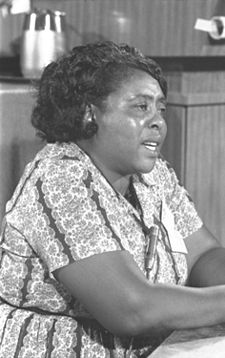In 1964, as a founder of the Mississippi Freedom Democratic Party (MFDP), she stepped on the broader national scene when she challenged the seating of the Mississippi delegation—all white—at the Democratic National Convention. Her speech that had the oft quoted phrase “sick and tired of being sick and tired” helped to grant others MFDP delegates the right to speak and special seating. This mother and activist also worked with other groups to improve the lives of the oppressed. Hamer often sang Christian hymns in the midst of her work, seemingly connecting her physical battle with a war in the spiritual realm. In 1993, this freedom fighter was posthumously inducted into the National Women’s Hall of Fame.
I related to Hamer. And even though I hadn’t seen the newsreel of her speech, my teacher said that my role play voice sounded just like Hamer. In my early 20s, I had had my share of discrimination. From being under the watchful eye of retail workers to professors discounting my classroom contributions to potential employers assuming my experience had only been granted because of a quota system, I knew the sting of racism. And though my sting was real, nothing compared to what Hamer and thousands of other blacks felt during the height of the Civil Rights Movement. That’s why I could only play the part of a Fannie Lou Hamer. She fought for her rights because “The only thing they could do to me was to kill me, and it seemed like they’d been trying to do that a little bit at a time ever since I could remember,” she said. Not being under the overt daily threat of death, the least I can do is to vigorously fight for justice in the sphere that the Lord has given to me. I challenge us all not to be comfortable in our Christianity, but to stand in the face of adversity and to speak out against those who seek to silence our voices. Fight for your freedom, whether racial or religious. This is what we are called to and must do to honor the memory of folks like Hamer and to give honor to our Lord and Savior Jesus Christ.
Copyright 2010 by Rhonda J. Smith
Sources: ibiblio, National Women’s Hall of Fame and Wikipedia

